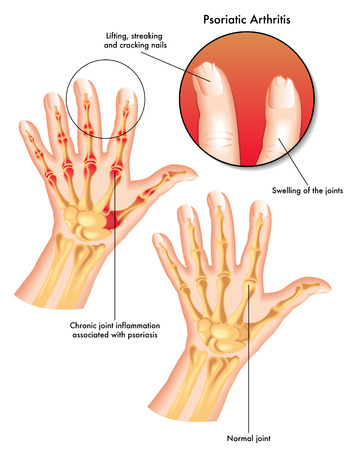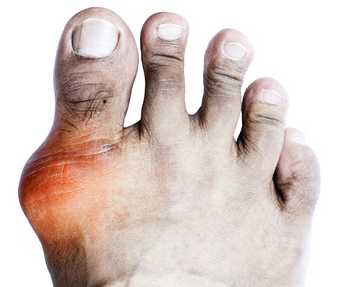Symptoms, remedies, treatments and care for Gout
Arthritis
 There are many different types of arthritis. It is actually a medical term used to describe more than one hundred types of rheumatic diseases and conditions that affect joints, the tissues that surround the joint and other connective tissue. The most common form of arthritis is osteoarthritis, which occurs when the protective cartilage on the ends of bones wears down over time. Other common rheumatic conditions include gout, fibromyalgia and rheumatoid arthritis.
There are many different types of arthritis. It is actually a medical term used to describe more than one hundred types of rheumatic diseases and conditions that affect joints, the tissues that surround the joint and other connective tissue. The most common form of arthritis is osteoarthritis, which occurs when the protective cartilage on the ends of bones wears down over time. Other common rheumatic conditions include gout, fibromyalgia and rheumatoid arthritis.Common arthritis joint symptoms include swelling, pain, stiffness, tenderness, grating sensation, bone spurs and decreased range of motion. These symptoms may come and go and they can be mild, moderate or severe. They may stay about the same for years, but may progress or get worse over time. Severe arthritis can result in chronic pain, inability to do daily activities and make it difficult to walk or climb stairs. Arthritis can cause permanent joint damages. Sometimes these damages may be visible, such as knobby finger joints, but often the damage can only be seen on X-ray. Certain types of arthritis also affect the heart, eyes, lungs, kidneys and skin as well as the joints.
Remedies:
3.9



 (182)
(182)



 (182)
(182)
Effectiveness: 3.9 Popularity: 182
3.6



 (121)
(121)



 (121)
(121)
Effectiveness: 3.6 Popularity: 121
2.0

 (104)
(104)

 (104)
(104)
Effectiveness: 2.0 Popularity: 104
3.0


 (103)
(103)


 (103)
(103)
Effectiveness: 3.0 Popularity: 103
2.9


 (93)
(93)


 (93)
(93)
Effectiveness: 2.9 Popularity: 93
3.3



 (92)
(92)



 (92)
(92)
Effectiveness: 3.3 Popularity: 92
3.1



 (78)
(78)



 (78)
(78)
Effectiveness: 3.1 Popularity: 78
3.2



 (73)
(73)



 (73)
(73)
Effectiveness: 3.2 Popularity: 73
3.0


 (68)
(68)


 (68)
(68)
Effectiveness: 3.0 Popularity: 68
1.4

 (65)
(65)

 (65)
(65)
Effectiveness: 1.4 Popularity: 65
3.5



 (56)
(56)



 (56)
(56)
Effectiveness: 3.5 Popularity: 56
3.4



 (53)
(53)



 (53)
(53)
Effectiveness: 3.4 Popularity: 53
1.7

 (24)
(24)

 (24)
(24)
Effectiveness: 1.7 Popularity: 24
3.0


 (23)
(23)


 (23)
(23)
Effectiveness: 3.0 Popularity: 23
3.0


 (19)
(19)


 (19)
(19)
Effectiveness: 3.0 Popularity: 19
2.1


 (15)
(15)


 (15)
(15)
Effectiveness: 2.1 Popularity: 15
2.3


 (4)
(4)


 (4)
(4)
Effectiveness: 2.3 Popularity: 4
2.2


 (4)
(4)


 (4)
(4)
Effectiveness: 2.2 Popularity: 4
1.4

 (3)
(3)

 (3)
(3)
Effectiveness: 1.4 Popularity: 3
1.0
 (1)
(1)
 (1)
(1)
Effectiveness: 1.0 Popularity: 1
Effectiveness: N/A Popularity: 0
Effectiveness: N/A Popularity: 0
Effectiveness: N/A Popularity: 0
Effectiveness: N/A Popularity: 0
Effectiveness: N/A Popularity: 0
Gout
 Gout is a form of arthritis characterized by sudden, severe attacks of pain, swelling, redness and tenderness in the joints. The small joint at the base of the big toe is the most common site for an attack. Other joints that can be affected include the ankles, knees, wrists, fingers, and elbows. An attack of gout often occurs suddenly and mostly in the middle of the night. The affected joint feels hot, swollen and tender as if it is on fire.
Gout is a form of arthritis characterized by sudden, severe attacks of pain, swelling, redness and tenderness in the joints. The small joint at the base of the big toe is the most common site for an attack. Other joints that can be affected include the ankles, knees, wrists, fingers, and elbows. An attack of gout often occurs suddenly and mostly in the middle of the night. The affected joint feels hot, swollen and tender as if it is on fire. The signs and symptoms of gout include:
- Intense joint pain. Gout usually affects the large joint of your big toe, but it can occur in any joint. Other commonly affected joints include the ankles, knees, elbows, wrists and fingers. The pain is likely to be most severe within the first four to 12 hours after it begins.
- Lingering discomfort. After the most severe pain subsides, some joint discomfort may last from a few days to a few weeks. Later attacks are likely to last longer and affect more joints.
- Inflammation and redness. The affected joint or joints become swollen, tender, warm and red.
- Limited range of motion. As gout progresses, you may not be able to move your joints normally.
Gout is caused by having high levels of uric acid in the blood, which leads to urate crystals accumulate in the joints. Uric acid is produced by your body when it breaks down purines, which are mostly found in certain foods such as organ meats, steak and seafood. Other foods which promote uric acid include alcoholic beverages (especially beer) and drinks containing fructose.
Remedies:
2.1


 (23)
(23)


 (23)
(23)
Effectiveness: 2.1 Popularity: 23
2.5


 (15)
(15)


 (15)
(15)
Effectiveness: 2.5 Popularity: 15
3.9



 (8)
(8)



 (8)
(8)
Effectiveness: 3.9 Popularity: 8
3.5



 (7)
(7)



 (7)
(7)
Effectiveness: 3.5 Popularity: 7
3.4



 (5)
(5)



 (5)
(5)
Effectiveness: 3.4 Popularity: 5
4.0



 (4)
(4)



 (4)
(4)
Effectiveness: 4.0 Popularity: 4
3.2



 (2)
(2)



 (2)
(2)
Effectiveness: 3.2 Popularity: 2
Cannot find information on an ailment or condition? Submit it to our system